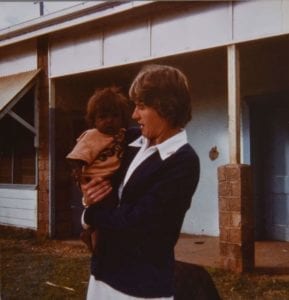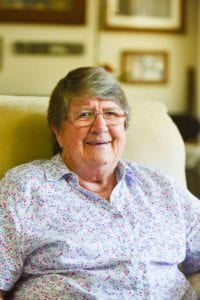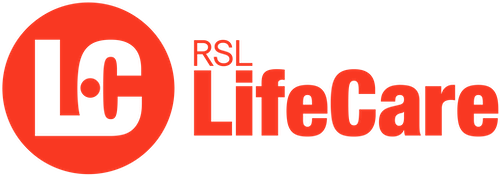In 1969, aged 22 and with only one year of nursing experience under my belt, I went remote area nursing to the mining town of Coober Pedy with the Bush Church Aid Society. My mother was horrified but I knew it was the right thing to do. I was excited by the thought of using my nursing qualifications to help others without access to immediate medical services. So there I was, myself and another young nursing sister, 1000kms from the closest doctor, connected by 2-way radio to the Royal Flying Doctor Service and given the task of caring for the town’s population of 600 mining men and the families of the local area….
It was exciting to say the least. I’m a practical person so if something broke down like the car or the generator, we’d have a go at fixing it. Being so remote we used our own initiative and did a lot of our own diagnosing. We ran a clinic as well as a four-bed hospital and would radio the doctor for advice. The doctor flew in about once a month and other than that, it was up to us. But we felt looked after; they knew how valuable the service was for the locals. Being a mining town, it was very important to have a medical service on the ground. People were extremely helpful if things broke down or if we’d have to go out to the airstrip for the flying doctor to come in for an emergency in the night – they’d drive out and help us light the pitch-black airstrip with their car headlights. I grew so much in the four years I was there, all the time knowing that what we were doing was valuable to the community.
While I was there, I earned a Royal Humane Society Award for a mine rescue I did. A man had fallen down the shaft in the night and he was missing; he and his brothers had been on a bit of a booze up and they were going home. The opal minefields were all exposed with only a pile of dirt on the side. The brothers dropped this fellow off next to a dugout thinking it was his home but in fact it was in the middle of a 14-mile minefield. He got out of the car and walked off straight into a big shaft, landing on his feet.
It took 14 hours to find him. We only had a heavy aircraft stretcher so we had to invent a way to get him up out of the shaft. A four-foot wide bore hole with a severely injured man is not a pleasant place to be, but I went down with another man (they had to look for a man small enough to fit in there with me) and we got him out. He ended up a paraplegic, he was only a young fellow about 19, but I later heard that he went on to make the most of his life by becoming an opal grader and trader.
After Coober Pedy my nurse friend and I took off camping around Australia for a year, then took up a job with the Presbyterian Board of Mission on Aboriginal Land in the remote Pitjantjara, a place called Ernabella. The people there were living their own way still; it was an amazing experience. They were never encouraged to do things our way. Instead we tried to do things their way and to share our ways with them as well. It was an alcohol-free community with their own native doctors and we wanted them to keep living their way just with our support should they want it.

Photo: Anne at Ernabella
We were operating an out-patients clinic, although we also had some capacity for in-patients. We used to go to the headmaster’s house on a Sunday night with our 3rd grade readers in the local language and he would help us learn so we could be more competent at talking with and treating people in the hospital. We also trained two ladies as nurse-in-aids, so they could help us and in turn we helped them.
It was beautiful. Underfoot was the red dust of the dessert, the Musgrave mountain ranges were a spectacle as they changed from sunrise through to sunset over the course of the day. When we got time off we’d drive out of town to rockpools where we’d swim in the heat of the day. They taught us how to find water and native food in the dessert so if we were ever lost we’d be able to keep ourselves going. The morning would be filled with the singing of the Aboriginal people sitting together in the creek bed. It was just a lovely environment to work in. It had its issues too, of course. Their own laws and rules meant that if someone did something wrong they were likely to get a spearing in the thigh and we’d have to pick up the damage after. So the experience touched on their culture quite a lot. But they adopted each of us into a family so to speak, and that family looked after us. I was there for about three years and in that time I married my husband, who was working in Ernabella as a fitter and turner. The locals had never seen a wedding of two white people, so it was a truly special experience for us all.
We returned to Tumut, NSW, when I was pregnant with our first child, a boy, then moved to Canberra, welcomed another son into our family and over time also cared for two foster boys (brothers). Canberra became home, and still is.
When the boys were in college I went back to school myself, studying theology with Charles Sturt University and St Marks in Canberra. I had a heart for helping people and at the time I was working with the elderly in the community. I was ordained a deacon, then archdeacon, overseeing the ministry in this area. My focus was on keeping the elderly in our community connected to their church and to be there for people as a chaplain. I ended up working here at Coral Park, Page (where I now live) as a chaplain for the frail, aged and dying.
I put some programs into place which have now been running for over eight years thanks to the hard work of many and a gracious bequest which has helped considerably with funding our four part time staff. We call it the Holistic Care Nursing Ministry and it is run from Holy Covenant Anglican Church, Canberra. The program has several arms: One arm takes older, isolated people on an outing to places such as the botanical gardens, or Floriade. Another arm works with ACT’s Housing Tenancy Support with people who are overwhelmed by their hoarding. We work with them in a holistic way, also connecting them with our programs which are held at the church but aren’t church – scrabble, craft, card making, yoga, meditation, any of those things. Perhaps the biggest arm is our day hospice at the church, called Covenant Care, which runs every Monday. People living at home with a life-limiting illness can come to us and have “a day with a difference”. We have a registered nurse on the program and volunteers, so their carer knows they’re being well looked after. Over time we’ve observed that our clients spend fewer days in hospital. Despite some of them being very ill they still join in, they love coming. They’re enlivened by this day of difference which includes pet therapy, entertainment, wonderful food and friendship, so they’re in a better place within themselves and the carer copes better having had a day off. We provide our clients with a 2-course meal, donated by our local Southern Cross Club, which is wonderful. It’s very successful and it’s the only day hospice in Canberra. It’s a good place to be and I’m both humbled and proud of my involvement in it.
Last year I received an Order of Australia Medal for services to the Anglican Church of Australia and to the community, which includes my work at Coober Pedy, Ernabella and more recently with the frail and aged in Canberra. When I trained as a nurse I knew I wanted to help other people, but it wasn’t until I found myself in Coober Pedy that I realised it was more targeted than that: I had a heart for the remote, the marginalised, the isolated and the ones who have fallen through the cracks. That is what my life’s mission was. And still is.

Photo: Anne Ranse is a resident at Coral Park Village, Page, ACT
Words: Helen Johnston
Photography: Acumen photography
Continue Reading
Discover our Services
Home Care
Retirement Living
Residential Care
Veteran Services
Download a brochure
We'll never share your email address and you can opt out at any time, we promise


